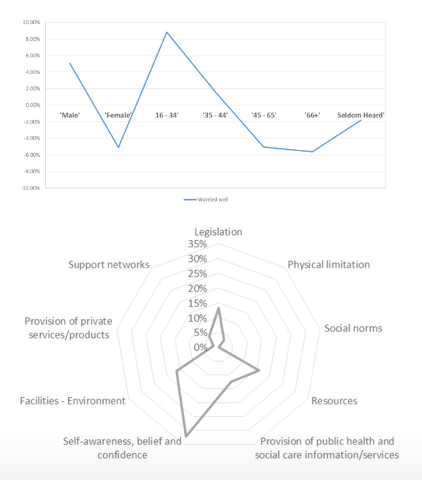10% of our people are “worried well”.
This population has more men and less women that the average, with more younger people (especially 16-34 year olds), less older people and just as many “seldom heard” people.

When discussing what hinders or helps people to take charge of their health? Their conversation reveals four priorities:
- Self-awareness, belief and confidence
- Facilities and the physical environment
- Personal resources – time and money
- Legislation
Interestingly, this was the only group who place real emphasis on legislation.
We can create a “typical narrative” from their ideas, comments and votes in the online workshop too.
Whilst some people might describe me as healthy, I know I need to be healthier. Sometimes this is difficult because…
Self-awareness, belief and confidence
It requires a lot of discipline and motivation to stay focused and keep my healthy habits.
“Taking charge of your own health is a conscious discipline, regardless of your understanding of what being healthy is, you have to be in the mental position to be focused and not distracted by what are sometimes excuses as to why your behaviour isn’t healthy.”
“This one combination can make exercising really easy, your heart is the hardest-working muscle in your body. Its job is to pump blood through your body every day of your life!”
Facilities – environment
The leisure facilities that are in my area are not good enough. For example, there are no modern swimming pools and no affordable gyms and pitches.
“There are no modern swimming pools in my area that aren’t linked to expensive gym memberships…we don’t want to be shivering in cold, poorly maintained, old fashioned council swimming baths.”
“Lack of affordable pitches and gym in Manchester to be physically active”
Resources
I try to do my best to stick to my gym routine and cook healthy meals as much as I can. But working long hours and having a family to take care of makes it really difficult.
“The reduced hours will improve work life balance, reduce stress, give people the additional time to cook healthy meals and take exercise. This would help to reduce obesity, diabetes, create a happier community and save the NHS a fortune”.
Legislation
The legislations that are currently in place encourage unhealthy behaviours and habits.
“Reduce working days to 6 hours max and introduce 3 day weekend on alternate weeks. All this to be done whilst pay levels are protected.”
“What is the point of having such excessive hours available (ie: 24 hour) and then being surprised at the level of binge drinking.”
Interestingly, solutions offered by this population include:
>Reduce the cost of gym memberships
>Invest more in mental health services
>Limit the time during which people can purchase alcohol
>Reduce working hours